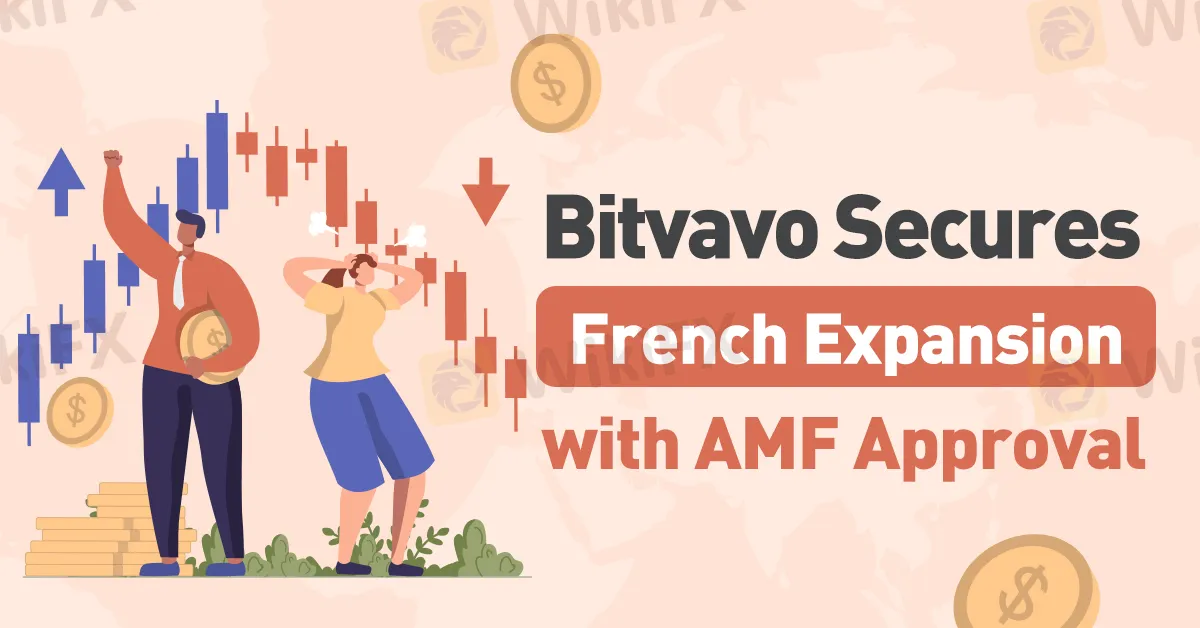简体中文
繁體中文
English
Pусский
日本語
ภาษาไทย
Tiếng Việt
Bahasa Indonesia
Español
हिन्दी
Filippiiniläinen
Français
Deutsch
Português
Türkçe
한국어
العربية
Bitvavo Secures French Expansion with AMF Approval
Abstract:Bitvavo, a Dutch cryptocurrency exchange, has set its sights on the French market, securing a pivotal nod from France's financial authority, Autorité des Marchés Financiers (AMF), marking a significant step in its European expansion amid shifting investment trends.

Bitvavo, a Dutch cryptocurrency exchange, has expanded its reach to France, securing approval from the country's financial authority, Autorité des Marchés Financiers (AMF). This strategic move marks a significant step in Bitvavos European expansion, building upon recent nods from Austrian regulators and earlier strides into the Italian market.
Founded in 2018 and headquartered in Amsterdam, Bitvavo operates in compliance with Dutch regulatory standards as a member of the Dutch Association of Bitcoin Companies.
The endorsement from AMF stands as a pivotal milestone in Bitvavo's growth roadmap. CEO Mark Nuvelstijn expressed intentions to introduce their user-centric services to French clientele, showcasing confidence in the platform's potential within the local market.
This expansion aligns with evolving investment patterns among French citizens. A survey conducted by AMF revealed that cryptocurrency ownership in France has eclipsed traditional stocks and bonds, with 9% of the population invested in digital assets. This insight serves as fuel for Bitvavo's European ambitions, aiming to meet the burgeoning demand for cryptocurrency services.
Already serving approximately 1.5 million customers in the Benelux region, Bitvavos foray into France is poised to bolster its presence across the broader European landscape.
In recent headlines, Gemini, the cryptocurrency exchange founded by Cameron and Tyler Winklevoss, urged its Dutch users to withdraw or transfer their assets to another wallet address, suggesting Bitvavo as an alternative for asset migration.
France is in the process of adjusting its cryptocurrency regulations to align with the overarching European framework established by Markets in Crypto-Assets (MiCA). AMF, Frances primary financial authority, disclosed the specifics of its General Regulation and policies for digital asset service providers (DASPs) in August.
The new regulations necessitate compliance measures for crypto platforms, including conflict of interest management systems, heightened disclosure obligations, segregation of client assets, and explicit consent requirements for utilizing client assets. These changes aim to harmonize Frances crypto landscape with broader European regulatory standards.
Currently, France hosts approximately 74 registered crypto companies, a number expected to swell in the future. Circle recently joined this roster of crypto firms securing major regulatory approvals in France, following the paths of Binance and Crypto.com. In recent months, brokerage firm eToro and Digital Currency Group‘s Luno have also registered with France’s AMF, signaling the growing appeal of the French market among prominent players in the cryptocurrency sphere.

Disclaimer:
The views in this article only represent the author's personal views, and do not constitute investment advice on this platform. This platform does not guarantee the accuracy, completeness and timeliness of the information in the article, and will not be liable for any loss caused by the use of or reliance on the information in the article.
Read more

Big News! UK 30-Year Bond Yields Soar to 25-Year High!
Following the successful auction of 30-year government bonds by the UK, the yield on 30-year bonds surged, reaching its highest level in 25 years. This increase reflects growing concerns in the market over the government's fiscal policies and large-scale debt issuance.

Beware of Fraudulent Letters: Malaysia’s Securities Commission Issues Warning
The Securities Commission Malaysia (SC) has raised an alarm over fraudulent letters and emails falsely claiming to be from the regulatory body. These fake communications are allegedly tied to illicit investment schemes that seek payments from unsuspecting investors.

Singapore’s New Law Allows Police to Freeze Scam Victims’ Bank Accounts
Singapore has enacted a new law enabling police to freeze bank accounts of scam victims as a last-resort measure to prevent financial losses.

Rising U.S. Corporate Bankruptcies Deepen Economic Concerns
In 2024, 686 U.S. companies filed for bankruptcy, marking the highest number since 2010.
WikiFX Broker
Latest News
Ghana Trader Jailed for $300K Forex and Crypto Scam
US Dollar Surge Dominates Forex Market
Hong Kong Police Bust Deepfake Crypto Scam Syndicate Involving $34 Million
Is it a good time to buy Korean Won with the current depreciation?
Pepperstone Sponsored the "Aston Martin Aramco Formula One Team"
ACY Securities Integrates MetaTrader 5 to Enhnace Copy Trading Service
Soegee Futures Review: Should You Trust This Broker?
Malaysian Pilot Loses RM1.36 Million in UVKXE Investment App Scam
Indonesia officially joins the BRICS countries
Attention! Goldman Sachs Cuts Gold Target to $2910
Currency Calculator






